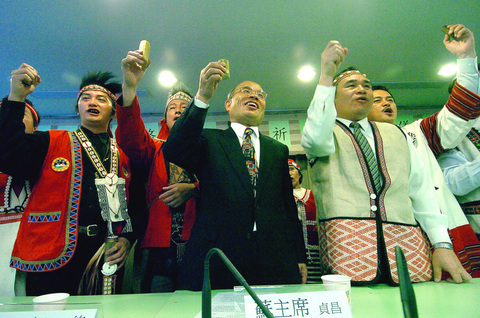In an effort to highlight the importance it attaches to Aboriginals, the Democratic Progressive Party (DPP) nominated seven Aboriginal candidates for the National Assembly elections on May 14.
The selection of Aboriginal candidates to be included in the DPP's list of 150 nominees for the National Assembly elections represents the party's respect for the group by including them in the constitutional amendment process, DPP officials said.
"Aboriginal peoples are the original inhabitants of Taiwan," said DPP Chairman Su Tseng-chang (蘇貞昌), after introducing the seven Aboriginal candidates last week. "They should enjoy the right to participate in constitutional amendments."

PHOTO: SEAN CHAO, TAIPEI TIMES
In a blessing ceremony held by the party last week, leaders and respected elders from the Paiwan, Amis, Saisyat, Tsou and Atayal tribes wore traditional clothes and performed tribal ceremonies to bless the Aboriginal candidates from each tribe.
Speaking at the event, Mayaw Kumu, Deputy Director of the DPP's Ethnic Affairs Department, said that the party wants to include the voice of Aboriginals in the decision-making process of constitutional revision.
The selection of Aboriginals also honored the New Partnership Treaty Between the Indigenous Peoples and Government of Taiwan, a document President Chen Shui-bian (陳水扁) signed to promote Aboriginal autonomy, Mayaw said.
"The seven Aboriginal representatives will take the opportunity to press for the establishment of an `Aboriginal clause' in the Constitution to ensure that Aboriginal peoples' treaty rights will be protected," Mayaw said.
Comparing the party's recommendation list to that of the Chinese Nationalist Party's (KMT), which nominated five Aboriginal candidates, Mayaw said that the DPP is giving a chance to younger Aboriginals to represent the younger generation.
"Participating in constitutional reform provides the younger generation with a great chance to understand more about national policies and the way politics work," he said.
"More importantly, the sprit of Aboriginal political movements can hopefully be handed to the next generation as they take part in the country's evolution and strive for Aboriginal rights in constitutional reform," Mayaw said.
The seven candidates are: Former presidential advisor Antonio Hong (鴻義章) of the Amis tribe; president of Yushan Theological College & Seminary Pusing Tali (高萬金) of the Atayal tribe; Voyu Yakumangana of the Tsou tribe and executive director of the Association for Taiwan Indigenous People's Policies; Liglove Awu of the Paiwan tribe and executive director of Millet Foundation; Icyang Parod of the Amis tribe and Chief of Aboriginal Affairs under the Taipei County Government; Dahurshi, who is general director of Saisyat Tribe Culture Development Association; and Tsong (曾智勇) of the Paiwan tribe and chief of Aboriginal Affairs under Pingtung County Government. Six of the seven candidates are male, and all are in their 30s or 40s.
Most of them have been selected from the Aboriginal rights, cultural, religious and political fields.
"I think the most important issue the Aboriginal candidates need to address is the establishment of the `Aboriginal Chapter' in the Constitution," said Liglove, the only female nominee among the group.
Voyu, who has been devoted to Aboriginal rights since college, agreed that including Aboriginal rights in the Constitution is the primary goal for Aboriginal candidates.
"The Aboriginal Chapter will address important issues such as the setup of an autonomous region for Aboriginals, resource allocation and land ownership," Voyu said.
"In addition to Aboriginal rights, I think participating in constitutional reform will raise the political status of the Aboriginal people and give us sort of a formal recognition by the country," Voyu said.

Taiwan is stepping up plans to create self-sufficient supply chains for combat drones and increase foreign orders from the US to counter China’s numerical superiority, a defense official said on Saturday. Commenting on condition of anonymity, the official said the nation’s armed forces are in agreement with US Admiral Samuel Paparo’s assessment that Taiwan’s military must be prepared to turn the nation’s waters into a “hellscape” for the Chinese People’s Liberation Army (PLA). Paparo, the commander of the US Indo-Pacific Command, reiterated the concept during a Congressional hearing in Washington on Wednesday. He first coined the term in a security conference last

DEFENSE: The National Security Bureau promised to expand communication and intelligence cooperation with global partners and enhance its strategic analytical skills China has not only increased military exercises and “gray zone” tactics against Taiwan this year, but also continues to recruit military personnel for espionage, the National Security Bureau (NSB) said yesterday in a report to the Legislative Yuan. The bureau submitted the report ahead of NSB Director-General Tsai Ming-yen’s (蔡明彥) appearance before the Foreign and National Defense Committee today. Last year, the Chinese People’s Liberation Army (PLA) conducted “Joint Sword-2024A and B” military exercises targeting Taiwan and carried out 40 combat readiness patrols, the bureau said. In addition, Chinese military aircraft entered Taiwan’s airspace 3,070 times last year, up about

A magnitude 4.3 earthquake struck eastern Taiwan's Hualien County at 8:31am today, according to the Central Weather Administration (CWA). The epicenter of the temblor was located in Hualien County, about 70.3 kilometers south southwest of Hualien County Hall, at a depth of 23.2km, according to the administration. There were no immediate reports of damage resulting from the quake. The earthquake's intensity, which gauges the actual effect of a temblor, was highest in Taitung County, where it measured 3 on Taiwan's 7-tier intensity scale. The quake also measured an intensity of 2 in Hualien and Nantou counties, the CWA said.

The Overseas Community Affairs Council (OCAC) yesterday announced a fundraising campaign to support survivors of the magnitude 7.7 earthquake that struck Myanmar on March 28, with two prayer events scheduled in Taipei and Taichung later this week. “While initial rescue operations have concluded [in Myanmar], many survivors are now facing increasingly difficult living conditions,” OCAC Minister Hsu Chia-ching (徐佳青) told a news conference in Taipei. The fundraising campaign, which runs through May 31, is focused on supporting the reconstruction of damaged overseas compatriot schools, assisting students from Myanmar in Taiwan, and providing essential items, such as drinking water, food and medical supplies,